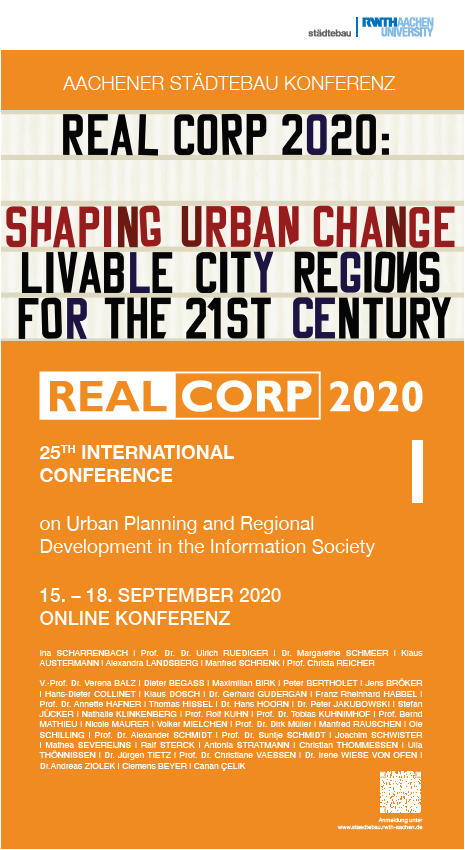REAL CORP 2020: SHAPING URBAN CHANGE
Livable City Regions for the 21st Century
25th International Conference on Urban Planning, Regional Development, Information Society and Urban, Transport, and Environmental Technologies
Aachen, Germany, September 2020
Organization:CORP-Comeptence Center of Urban and Regional Planning, RWTH Aachen University – Chair and Institute for Urban Design, Ministry for Regional Identity, Communities and Local Government, Building and Gender Equality of the Land North Rhine-Westphalia, ISOCARP – International Society of City and Regional Planners,
At the beginning of the 21st century, the question of how we should shape the future of our cities and regions is more important than ever. Urban spaces are becoming the central form of organization of almost all human societies. In the emerging and developing countries, the force of the urbanization surge is becoming visible. The urban population is growing as people move out of rural areas; this growth process is accompanied by social change. In many parts of Europe a fundamental paradigm shift is taking place: from a phase of shrinking and stagnation to enormous growth of cities and regions. It is not only the large cities that are coming under real pressure; medium-sized and small towns and cities are also facing the challenge of how to meet the demands of climate change and the associated need to secure open spaces on the one hand, and to densify and make available space for living and working on the other.
Many inner cities lack affordable housing, while at the same time the surrounding area suffers from vacancies. Incorrect allocations generate unnecessary commuter flows. Against this background, intermunicipal cooperation is an obvious way of achieving the necessary balance between different development dynamics. The current intensive discourse on “Low Carbon Cities” or “Smart Cities”, the question of the future development of cities under the conditions of climate change, the use of energy-saving technologies and the foreseeable depletion of fossil resources, raises concrete questions about future urban development and urban design that can only be answered in part so far. In the search for concepts and strategies, sustainability, resilience, a high quality of life and careful use of natural resources are among the central objectives of urban and spatial development.
Within the framework of REAL CORP 2020, global transformation processes and experiences will be discussed on the one hand, while on the other hand there will be an in-depth examination of individual German regions such as “Rheinisches Revier” and Lausitz, where political decisions to phase out lignite mining have raised pressing questions about the future prospects of regions: What does a climate-neutral model region of the 21st century look like? What strategies, concepts and processes can be used to successfully restructure a region that has been characterised by mining, industry and resettlement since the 19th century?The future urban planning objectives will have to provide answers to the general challenges as they apply more or less to all cities and urban regions – regardless of whether cities are growing or shrinking, regardless of whether cities want to become metropolises, regional cities or explicit green cities. Often such simplistic dualisms do not face each other anyway, but are part of a comprehensive and contradictory transformation process that cities go through in the course of their history.
Against the background of the transformation tasks ahead, it is clear that urban design is slowly but noticeably becoming a „supreme discipline“ again. This is why REAL CORP 2020 is also the 1st Aachen Conference on Urban Design. This format is intended to lead the international discourse on a contemporary understanding of urban development and to promote an exchange of strategies and concepts between research, practice and politics. After all, urban design and urban development must offer spatial and strategic concepts that ensure a sustainable quality of life for all.
